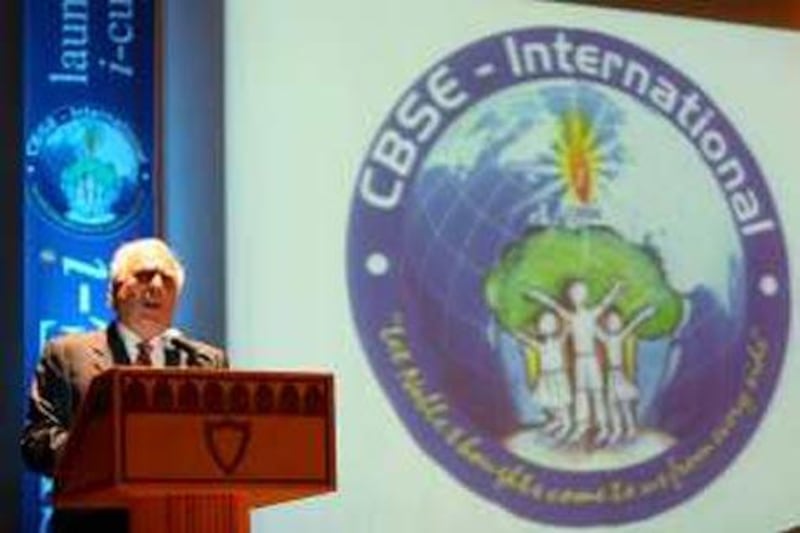DUBAI // An ambitious international version of the Indian educational board curriculum was launched yesterday, raising hopes that its global format would be accepted by Indian as well as foreign schools.
Thirty Indian schools in nine countries will start using the Central Board of Secondary Education International (CBSEI) syllabus from the current academic year. Kapil Sibal, India's human resource development minister, released what he described as an "internationally benchmarked curriculum" at The Indian High School in Dubai. The minister and dozens of Indian education professionals at the event hoped the CBSEI would soon compete with the International Baccalaureate (IB) education format currently popular at most international schools.
The CBSEI is much less expensive than the IB system, Mr Sibal said. The IB programme calls for expensive equipment and infrastructure at individual schools, making the lesser cost of the CCBSEI a potential selling point for schools with limited financial resources. "I dare say that parents and schools would soon demand [CBSEI]," Mr Sibal said. "We can compete with the IB system in terms of global quality education at a much lesser cost."
He said that the curriculum's global format is aimed at attracting schools catering to the large expatriate Indian population as well as non-Indian students planning to pursue studies in India in the future. "My line of thinking is that the education system should empower students around the world by providing access, inclusion and excellence," Mr Sibal said. "Once empowered, these children will be prepared for the global economy and the world."
About 180 Indian teachers are being trained in the new curriculum so they can relay the system to others. The Indian High School in Dubai has already accepted the CBSEI format. The system currently in use, the CBSE, is considered one of the toughest education systems. The format has often faced criticism from India and abroad for putting pressure on students to concentrate on scoring high marks on exams rather than gaining a depth of knowledge.
Educators said yesterday that the CBSEI shifts away from the rigid and fiercely competitive CBSE format by offering opportunities for extended learning. The new curriculum is expected to focus on the development of perspectives, research orientation and a more liberal approach to the arts. "A lot of children around the world are engaged in this unhealthy competition to score more than the student sitting next to them," Mr Sibal said. "That is not the goal of education. The goal is not to understand a complex mathematical equation but to understand life."
The CBSEI will take an alternative approach to mathematics, with the subject being taught at two levels. A standard level of mathematics is currently taught across CBSE-affiliated schools, which some weaker students find unduly challenging. Social sciences in the new curriculum will also include country-specific content so that a Dubai-based school following the CBSEI would have study material on the UAE.
The curriculum will be introduced in phases and is already being offered to overseas schools affiliated with the CBSE board. The curriculum will first be introduced to students entering grades 1 and 9 in the new academic year. "This curriculum will ensure young learners from India will be prepared for the challenges that they face in the world ahead," said Vineet Joshi, the CBSE chairman. "They will know how to deal with the 21st century."
At the launch of the international curriculum, Mr Sabil said: "While the world is moving towards globalisation, so must education. Access to education is a fundamental right, but access in itself is not enough as we need to deliver quality education." Meanwhile, Abdulla al Karam, the director general of the Knowledge and Human Development Authority in Dubai, said that while some diversity in curriculum is healthy, efforts should be made to standardise education.
"In Dubai there are 13 different curricula [for] around 200,000 students," he said. "This is unusual and poses several challenges which we faced during the inspections of schools, but we overcame it." @Email:pmenon@thenational.ae






